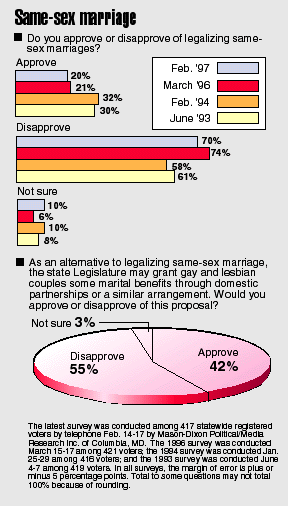

Fifty-five percent of those surveyed said they disapproved of granting benefits to same-sex couples, while 42 percent were in favor. The margin of error is plus or minus 5 percentage points.
Meanwhile, sentiments about legalizing same-gender marriage essentially remain the same as a year ago, with 70 percent of respondents saying they were against it.
The poll was taken as the state Senate and House prepared to go into conference committee in an attempt to settle differences between the two chambers.
While both have approved proposed constitutional amendments that would prohibit same-sex marriage, the House passed a companion bill that would grant four benefits to gay and lesbian couples who register as "reciprocal beneficiaries."
The Senate, with an eye toward equal rights issues raised by the state Supreme Court in a pivotal 1993 ruling, seeks to confer a much broader package of more than 200 state benefits, including the right to file state tax returns jointly.
Eric Rabe, 76, a retired insurance agent in Hilo, was against both same-sex marriage and the granting of benefits.
He said conferring benefits would "just be promoting gay and lesbian couples."
"I'm absolutely appalled that they even have that on the agenda," he said.
Aurora Fruehling, 62, also disapproved of same-sex marriage. However, the Manoa woman said her community volunteer work led to her belief that gay and lesbian couples should be given minimal benefits, particularly in areas such as hospital visitation rights.
"There are people in these relationships that have had long-term commitments, even longer than heterosexual marriages, and their devotion and care for each other is as sound as in traditional marriage," she said.
According to the poll, Democrats were much more likely to approve of same-sex marriage than Republicans (27 percent vs. 3 percent). Women who favored it outnumbered men by almost 2 to 1. Caucasians formed the largest racial block in support, with 35 percent saying they approved, while 85 percent of Filipinos were in opposition.
Democrats also were more likely to favor granting benefits than Republicans, 50 percent vs. 26 percent.
The gap between men and women lessened significantly.
Fifty-one percent of Caucasians approved of the benefits, and 43 percent of Filipinos. Japanese were the single largest ethnic block against benefits, with 59 percent registering disapproval.
